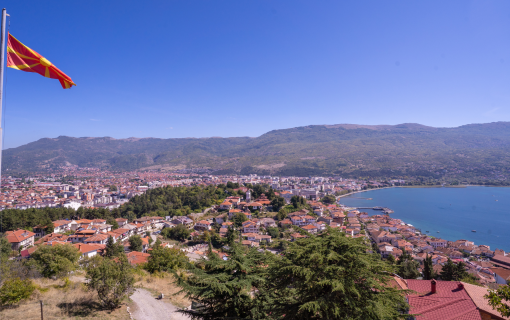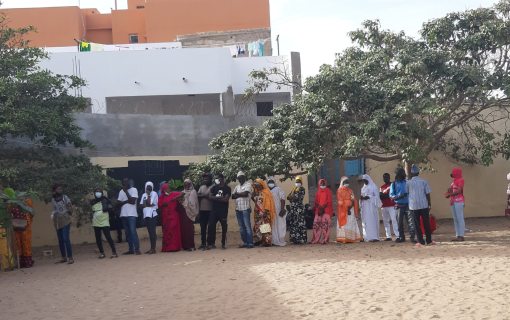
Vice President of Programs Testifies on Capitol Hill on Upcoming Elections in Latin America
On January 10, 2018, International Foundation for Electoral Systems (IFES) Vice President of Programs Michael Svetlik provided testimony to the House Foreign Affairs Subcommittee on the Western Hemisphere. He was invited to speak to Members of Congress about “Upcoming Elections in the Western Hemisphere: Implications for U.S. Policy,” in particular about the strengths of electoral institutions in the region and assistance provided by the U.S. government.
A recording of the Subcommittee hearing is available below, and a written version of Svetlik’s oral testimony follows:
Mr. Chairman, Ranking Member, and distinguished members of the Subcommittee: On behalf of IFES, thank you for this opportunity to discuss the vital role of election management bodies in ensuring credible elections in Latin America in 2018. With generous backing from USAID (U.S. Agency for International Development) and other international donors, IFES supports electoral processes worldwide. We are proud to work with our CEPPS (Consortium for Elections and Political Processes Strengthening) partners – IRI (International Republican Institute) and NDI (National Democratic Institute) – to build strong, inclusive democratic institutions.
Mr. Chairman, professional, transparent, and independent electoral institutions are the backbone of democracy. These bodies administer and oversee electoral processes that engender democratic stability, promote peace, and enhance social inclusion. Latin American electoral institutions were at the center of many successful democratic transitions in the past two decades, and they will play a critical role in the region’s 2018 election super cycle.
Despite significant progress, Latin American democracy is at a crossroads: Conditions are ripe for backsliding, largely due to the rise in disillusionment and a growing deficit of trust. As the 2017 Latino barómetro survey indicates, overall confidence in public institutions, including electoral tribunals, has declined since 2013. In fact, only 29 percent of Latin Americans express confidence in electoral tribunals, down from 51 percent in 2006, and lastly, 15 percent of those surveyed say they trust political parties. This low level of trust has been consistent over the past decade, falling from 28 percent in 1997. In light of this crisis of confidence, professional and independent election management is increasingly important.
Mexico, for example, has enjoyed considerable success in election management over the past two decades, through investment in well-resourced, independent and professional bodies. We applaud Mexico for the strength and capacity of its institutions, particularly the National Electoral Institute and the Electoral Tribunal. However, Mexico still faces several challenges that are common to elections across the region:
- First, illicit money and campaign finance: The enforcement of campaign finance regulations remains a persistent Achilles heel and bears close watching.
- Next, elections are on trial: Election arbiters and the courts will be tested with both pre- and post-election legal challenges that will require rapid resolution.
- Next, cyber security and outside influence: The likelihood of cyber-attacks varies but looms as a potential threat. Worst still is every country’s vulnerability to disinformation, which is equally as damaging.
- And lastly, inclusive democratic participation: Broad participation across society is critical, as democracy is more resilient when all groups are represented.
At the heart of each of these issues is citizen trust in institutions and electoral results. Democracy only works if the people believe it is working, and electoral institutions are only effective if they win public confidence through transparency, accountability and responsiveness. Electoral management bodies can build trust through such things as transparency in budgeting and in procurement; through professional communication and a strong presence in social media; through clear and accessible voter education; through consistency in results tabulation and transmission; and finally, the timely release of election results and clear systems to address election complaints.
More broadly speaking, Mr. Chairman, we ask you to consider the following for future assistance and engagement:
- We deeply appreciate Congress’ support of robust funding levels for democracy programs and encourage you to leverage your oversight role in ensuring appropriated funds are both obligated and spent.
- The U.S. Congress and Administration must unequivocally denounce efforts to erode fundamental democratic norms. I thank you, Mr. Chairman, for your December 21 statement on the Honduran elections, which expressed disappointment in irregularities but called for all parties to seek relief through established election dispute mechanisms.
- We recommend as well that election assistance should start early and continue through the post-election period, to allow for flexible and responsive programming. Multi-year, multi-election programs are the most impactful.
- And lastly, we recommend targeted support to improve electoral leadership, by facilitating peer-to-peer exchanges that build professional experience and spread best practices.
Mr. Chairman, thank you for this opportunity to testify. 2018 will be an important test for democratic institutions in Latin America. IFES remains committed to working with our partners and friends in the region to promote continued democratic consolidation. I look forward to any questions you may have.
Along with Chairman Paul Cook (R-Calif.) and Ranking Member Albio Sires (D-N.J.), Congressman Rob DeSantis (R-Fla.), Congresswoman Robin Kelly (D-Ill.), Congressman Gregory Meeks (D-N.Y.), Congressman Francis Rooney (R-Fla.), Congresswoman Ileana Ros-Lehtinen (R-Fla.), Congresswoman Norma Torres (D-Calif.), and Congressman Ted Yoho (R-Fla.) attended the hearing. Svetlik was joined on the panel by Katya Rimkunas, deputy director for Latin America and the Caribbean at the International Republican Institute, and Jim Swigert, senior associate and regional director of Latin America and Caribbean programs at the National Democratic Institute.
To read Svetlik’s written testimony, please click here.









